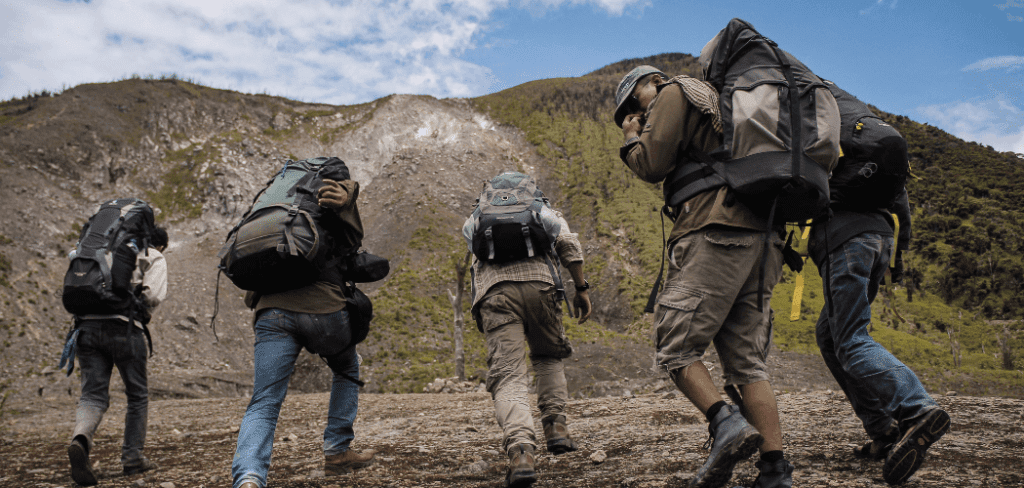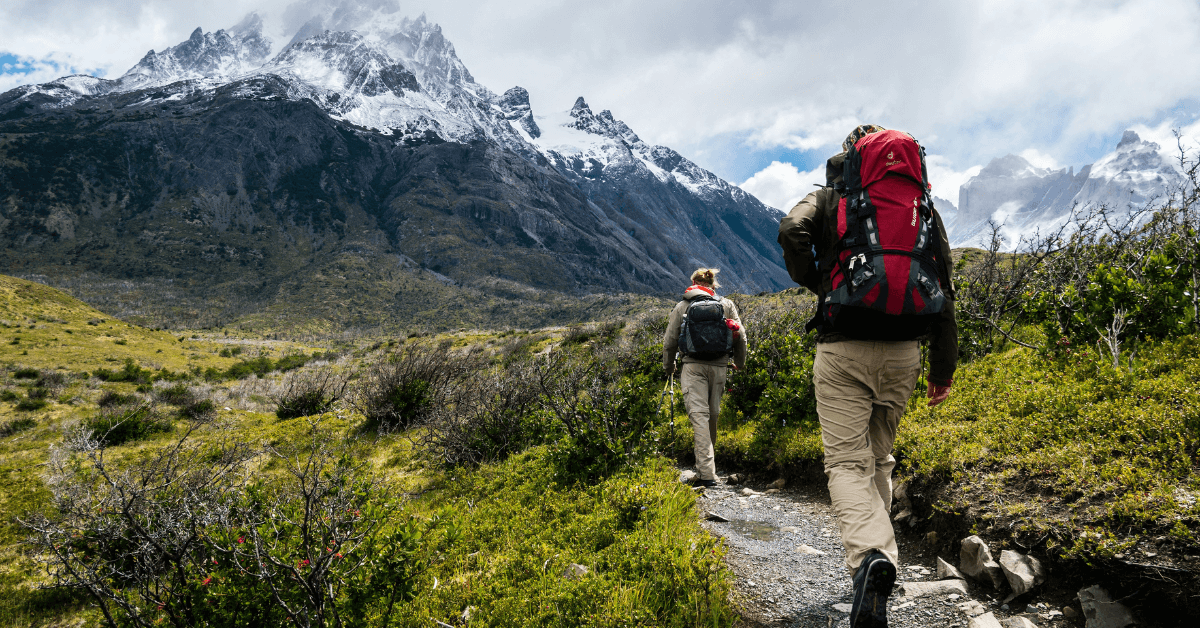It’s no secret that hiking is great for your physical and mental health, but it also comes with a wide range of social benefits. Most of these aren’t appreciated, and that’s one of the things that inspired me to create this detailed article on the 5 social benefits of hiking we should all be aware of.
Also, if you were looking for a reason to start hitting the trail, I’m confident this could just be the guide you needed to make the leap. Without further ado, let’s skip to the main section of the guide and look at the first social benefit of hiking.
1. Builds & Strengthens Relationships and Friendships
One of the most obvious social benefits of hiking is that it builds and strengthens all kinds of relationships. Hiking is a great way to build and strengthen relationships with family and friends. It allows individuals to spend quality time together in a natural setting, away from the distractions of daily life. This can create an opportunity for deeper conversations and connections. It also provides a chance for individuals to bond over shared experiences and challenges.
For families, hiking can be a great way to spend time together and create lasting memories. It can be a fun and healthy activity that can be enjoyed by people of all ages. Children can learn about nature and the importance of taking care of the environment while enjoying the outdoors. Parents can also use the time to connect with their children, build trust, and encourage independence.
For friends, hiking can be a great way to build deeper connections. It can be a great way to escape the distractions of daily life, and to focus on the present moment with friends. Sharing the experience of hiking and enjoying nature together can create a sense of camaraderie and belonging, strengthening relationships.
Additionally, hiking can also be a great way to improve communication skills. Being in nature can help to reduce stress and anxiety, which can make it easier for individuals to open up and have deeper conversations with each other. This can help to build trust, understanding, and intimacy in relationships.
Lastly, hiking can be a great way to challenge oneself and overcome obstacles together. It can be a great opportunity to support each other, to encourage and to help each other to overcome obstacles. This can help individuals develop a sense of teamwork and build trust in each other.
Related: The Best Dehydrated Backpacking Meals
2. Meeting New People
Another social benefit of hiking is the ability and opportunity to meet new and interesting people. Meeting people on the trail while hiking can have several advantages. One of the main advantages is the ability to connect with like-minded individuals who share a passion for hiking and the outdoors. These individuals are likely to have similar interests and goals, which can make for an enjoyable and fulfilling conversation.
Additionally, meeting people on the trail can provide an opportunity for social support. Hiking can be a challenging activity, and having someone to share the experience with can make it more enjoyable and less daunting. This can also be beneficial in case of emergency, having someone to help or to ask for assistance can be important.
Another advantage of meeting people on the trail is the potential to learn from others. Hikers who have more experience may be able to share tips and advice on different trails, gear, and hiking techniques. This can be especially helpful for new hikers who are still learning the ropes.
Meeting people on the trail can also lead to the formation of lasting friendships. Sharing the experience of hiking and enjoying nature together can create a sense of camaraderie and belonging, which can lead to the formation of lasting friendships.
Furthermore, meeting people on the trail can also be a great way to explore new trails and areas. Hikers who are familiar with an area can provide recommendations for new trails and routes that the individual may not have otherwise known about.
3. Building a Sense of Community

Hiking also boasts the ability to foster a sense of community among people with similar interests. One way to do this is by joining a hiking group or club. These groups often organize regular hikes, which provide an opportunity for individuals to connect with like-minded people and make new friends. This can be especially beneficial for people who are new to an area or for those who are looking to expand their social circle.
Participating in hiking groups can provide a sense of belonging and community, as individuals share a common interest in outdoor activities and nature. This can as well lead to the formation of lasting friendships, as individuals can share experiences and support each other in their outdoor pursuits.
Another way to meet new people while hiking is by participating in hiking events and festivals. These events often bring together a diverse group of people who share a passion for hiking and the outdoors. They provide an opportunity to meet new people and form connections with individuals who share similar interests.
Additionally, hiking can be a great way to challenge oneself and overcome obstacles together. It can be a great opportunity to support each other, to encourage and to help each other to overcome obstacles. This can help individuals to develop a sense of teamwork and to build trust in each other.
To conclude, joining a hiking group or club, participating in hiking events and festivals, and sharing the experience of hiking and enjoying nature together can lead to the formation of lasting friendships. Hiking also provides an opportunity to improve communication skills, to overcome obstacles together and to develop a sense of teamwork and trust. It is a fun, healthy, and rewarding activity that can be enjoyed by people of all ages, fitness levels, and backgrounds.
4. Can Also Help Strengthen Interpersonal Skills
One of the lesser-appreciated social benefits of hiking is its ability to strengthen one’s interpersonal skills. Hiking can help improve communication and interpersonal skills in a number of ways. First, hiking often requires working together as a team to navigate trails, set up camp, and make decisions about the group’s itinerary. This can improve communication skills by forcing individuals to share ideas, listen to other’s perspectives, and come to a consensus. Additionally, hiking can require individuals to rely on one another for physical and emotional support, which can foster trust and understanding between team members.
Another way hiking can improve communication and interpersonal skills is through the opportunity to practice active listening. When hiking in nature, there are often many distractions, such as the sounds of birds, the wind, and the rustling of leaves. To effectively communicate with others in these conditions, individuals must be able to focus their attention and actively listen to what others are saying. This practice can also help improve listening skills in other settings.
In addition, hiking can also help individuals develop self-awareness and emotional intelligence. Being in nature can provide a sense of perspective and calm, which can help individuals become more aware of their own thoughts and emotions. This can help individuals better understand and communicate their own needs and emotions, as well as empathize with others.
Finally, hiking can also help improve interpersonal skills by providing opportunities for individuals to bond with others. Spending time outdoors and engaging in physical activity can create a sense of camaraderie and shared experience, which can help individuals form deeper connections with others.
Related: Picnic Lunch Ideas For Hiking
5. Improving Emotional and Mental Well Being Through Social Interactions
The fifth, but by no means the least social benefit of hiking is it can help improve emotional and mental well-being. Hiking can have a positive impact on emotional and mental well-being in several ways. First, hiking can also be a social activity, which can help to improve emotional well-being. Spending time with friends and loved ones can help to reduce feelings of loneliness and isolation, which can be a risk factor for mental health problems.
Second, hiking can also be a form of exercise, which has been shown to have a positive impact on mental health. Exercise can release endorphins, which are chemicals in the brain that are associated with feelings of happiness and well-being. It also help to decrease the symptoms of depression and anxiety.
Third, hiking can also provide a sense of accomplishment and boost self-esteem. Completing a hike, especially one that is challenging, can give individuals a sense of pride and satisfaction, which can improve their overall sense of self-worth.
Fourth, being in nature can also help individuals disconnect from technology and other distractions, which can help them to focus on the present moment and reduce feelings of anxiety and depression.
Finally, being in nature has been shown to have a calming effect on the mind and can reduce stress levels. The natural environment can provide a sense of perspective and tranquility, which can help individuals to process their thoughts and emotions more effectively.
